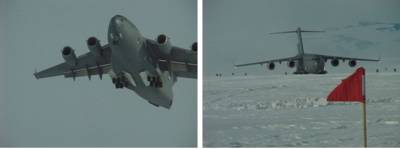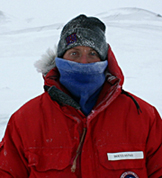Everybody knows this is Nowhere
"Everybody seems to wonder what it's like down here." Neil Young
Thursday, October 28, 2004
Definitely Mainbody
It’s almost November and the Mainbody season is under way and in full force. McMurdo Station is filling with people, sometimes at a disturbing rate. The population of the town is somewhere in the 900s. The sky-equipped C-130 Hercules planes have arrived from Scotia, NY and started taking people to the South Pole station. These are the specialized planes that have skis for landing gear, allowing them to use the ice runways we have here at McMurdo and at the South Pole station. The last sunset was about 1 week ago. The next sunset will be at 12:38am.....
on the 21st of February 2005.
The research is going well. Dr. Robert Maxson (from the University of Southern California, Health Sciences campus) joined our research group a couple of weeks ago. He and I have been spending a lot of our energy trying to understand how developing forms of Antarctic echinoderms regulate ribonucleic acid (RNA). Very quickly, RNA is the molecule that translates an animal’s genetic information (DNA) into its final product, protein. The flow of genetic information is DNA to RNA (process called transcription) and then RNA to protein (process called translation). Anyway, Rob and I are interested in how quickly RNA is being synthesized and degraded in early life stages of animals in Antarctica. So far there has been a lot of trouble-shooting, trying to find accurate ways to isolate and quantify the amount and different types of RNA in these animals. By understanding the RNA of these animals we hope to understand the potentially unique way in which these organisms tolerate (and actually thrive) in this environment, which is the coldest marine environment on planet Earth. Because the process of translating genetic information is so important (DNA, for the most part is only a ‘blue print’, it is the protein that is encoded by DNA that is the ‘working machine’ of an organism), one of the goals of my research is to understand the energetic cost of turning DNA into protein. It is a highly energy consuming process. To put this in perspective, somewhere between one fifth to one half of the energy your body spends during a day is used up for the sole purpose of turning DNA into protein (through transcription and translation). This means that if you are on a diet where you are neither gaining nor losing weight, 20 to 50% of your caloric intake is used to fuel these processes. So for animals living in the nutrient poor and very cold environment of Antarctica, evolutionary changes that allow for any increase in efficiency of these processes would be highly beneficial. As biologists, we are interested in seeing 1) if such ‘adaptations’ exist and, 2) if they do exist, what parts of these highly complex processes can be ‘tweaked’ to result in increased energy efficiency. Such research allows biologist to understand what rules in living organisms are fixed (they can’t be changed) and what rules can be ‘bent’ and allow an organism to adapt to its particular environment.
So anyway….
In a couple of days Dr. Maxson will be leaving us to go back to Los Angeles (he’s got his own lab that he runs at USC where he studies the interaction between gene regulation and development). When he leaves my boss from USC, Donal Manahan, will be arriving. He’ll spend about a month with us in McMurdo and help out with different aspects of the research.
Thursday, October 14, 2004
Night pix.
Okay, here are some night time pictures. Celebrating the days when the sun did go below the horizon. Actually, the sun is still setting, but just barely.
http://share.shutterfly.com/os.jsp?i=EeMN2rVo4bO-A&open=1
Friday, October 08, 2004
The shocking truth revealed behind the ice runway damage!

A nice piece of photoshop work depicting how the ice runway was REALLY damaged when the C-17 landed. Apparently it wasn't the "cleanest" of landings (in reality the landing was fine, it was just old ice with lots of airpockets in it). This gem was found on the McMurdo community common network drive, simply called the "i drive" (i.e. its drive letter designation). From time to time I'm sure I'll find other wonderful photos from the i drive to include for your blogging pleasure. 
Thursday, October 07, 2004
Mainbody delayed!!!! Well, sort of....
Well, it turns out Winfly hasn't truly ended yet. The first plane did land, but no other planes followed. Apparently the ice runway is having some unexpected problems. When the first plane landed (a big ole C-17), it actually damaged the ice runway pretty badly. Not sure the type of damage, but the rumors around town (and this town is great for anyone who loves a good rumor) are that the plane either 1) tore up one huge piece of ice from the runway, or 2) dug a huge rut into the runway. Either way the second plane (and several others scheduled to land in the subsequent days), which was supposed to land a couple of hours later, was turned around back to New Zealand (its point of origin) because the ice runway was no longer safe. So town is still rather quiet, only about 300 or so people. The rumormill has it that the runway will be ready to go by Saturday. A couple extra days of Winfly-sized McMurdo is quite enjoyable.
Wednesday, October 06, 2004
The end of Winfly....
Sorry for not writing lately. The research has kept me very busy. This blog thing is a new “responsibility” for me that I haven’t entirely figured out how to fit in my schedule yet. Anyway….
So, it’s the end of the Winfly season. Tomorrow is the big day when the Antarctic sky will fill with airplanes. Well, not really “fill” with airplanes, but 2 planes will be landing on the ice runway tomorrow. Both of the planes will be spewing out people and supplies and, if we are really lucky, fresh food. We’ve been in Antarctica for about 6 weeks so far. The Winfly season has been very kind to us in terms of the scientific research accomplished and the overall Antarctic experience. With less people on base during Winfly, life has much more of a family feel to it. You get a chance to know people better. On the science side of things, with less scientific research groups here, we get more attention and, more importantly, more space than we will come Mainbody (Mainbody is the word used to describe when Winfly is over and operations at McMurdo Station go into full swing). In fact, with the start of Mainbody our lab now has to move out of our cozy little office space as well as our aquarium laboratory. Basically, we have to share more. Not a problem, but we have grown to enjoy the extra space afforded to us by the Winfly season.
A great thing about Winfly is the chance to experience the Antarctic night. The stars are brilliant and if you are really lucky, you’ll get to see the Southern lights (aurora australialis). We weren’t lucky, but hey, the stars were great. The sun remains very low on the horizon during the late winter period as well. This creates sunrises and sunsets that can last for hours on end. At this point though, the night as all but evaporated. As I write this it’s 10pm and the sun has just set behind the Trans-Antarctic Mountains, creating a twilight condition that will probably last the next 3-4 hours. At which point it will get just a bit darker and stars will be seen, but only briefly as the sun will shortly begin to rise again. As the days continue, the sun’s dip below the horizon will get shallower and shallower as the twilight darkness becomes less and less. Finally, the sun will not drop below the horizon, but briefly disappear only behind the trans-Antarctic Mountains. By mid-October the sun no longer dips low enough to be obscured by anything, at which point it will simply run circles around us getting higher and higher in the sky, providing constant daylight. Only in late February will the sun venture below the horizon again.
At this point I’m trying to get some pictures together showing the evening and night time look of McMurdo. Cause after that, it'll be nothing but daytime photography. Hopefully in a couple of days I’ll have those ready for you and have the link to them posted here.





